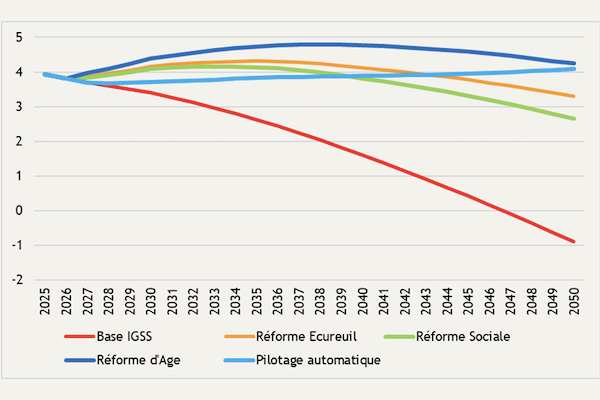 Evolution of the reserves for Luxembourg's general pension scheme based on IDEA's four proposed scenarios;
Credit: Fondation IDEA
Evolution of the reserves for Luxembourg's general pension scheme based on IDEA's four proposed scenarios;
Credit: Fondation IDEA
On Thursday 3 April 2025, Fondation IDEA Asbl held a press conference at Luxembourg’s Chamber of Commerce, where it presented its suggestions for reforms to Luxembourg's pension system.
Director at Fondation IDEA, Vincent Hein, hosted the conference, which featured presentations from Senior Economist at Fondation IDEA, Jean-Baptiste Nivet, and Director at Fondation IDEA, Muriel Bouchet.
Vincent Hein began by providing background on the creation of the proposals, detailing how the Luxembourg think-tank had already carried out two studies, in 2017 and 2018, which investigated potential reforms to the pension system. He emphasised the necessity of undertaking a further study of pension reforms, and stressed: "This system concerns us all, given that it is a fundamental element of the social contract that binds us across generations." He added: "The issue of population ageing, which has already provoked reforms in many European countries, is a problem which Luxembourg cannot escape."
Jean-Baptiste Nivet then provided background on the process of compiling the study, detailing how researchers undertook analyses in relation to the financial viability of the pension system and the timing of any reforms. Stressing the need for changes to the system, he noted: "If we don't ensure the financial future today, there will be very negative social aspects in the future."
Muriel Bouchet subsequently presented a detailed breakdown of the suggested reforms, in which he highlighted the eight principles which guided the study: securing the financial future of the pension system; ensuring fairness and maintaining social cohesion; maintaining a direct link between contributions and benefits; maintaining the continuity of the pension system; creating simple and transparent rules; allowing for flexibility in the system to aid in the transition from working life to retirement; avoiding the possibility of fiscal slippage; and factoring in the unpredictability of future events.
He then detailed the four reform scenarios, categorising them as: “Squirrel”, which concentrates on financial sustainability; “Social”, which targets solidarity and harmony within the system; “Age”, which focuses on adapting the system in relation to increased life expectancy; and “Autopilot”, which factors in responses to any fiscal unpredictability.
The “Squirrel” scenario proposes a fiscally conservative reform path, which combines revenue increases with targeted spending reductions, while maintaining protections for lower-income retirees. This scenario also proposes that the state assume administrative costs which the National Pension Insurance Fund (CNAP) currently bears. Fondation IDEA noted that this scenario would "preserve Luxembourg's pension reserves while addressing imminent deficit projections".
The “Social” scenario proposes retaining the current pension calculation formula but, gradually, reducing the proportion of pensions based on the total contributory income. However, the flat-rate portion of the pension would still increase over time. Fondation IDEA noted that this would safeguard benefits for vulnerable retirees and preserve the end-of-year allowance for those receiving minimum pensions.
The “Age” scenario suggests the indexation of retirement age to life expectancy by using a "longevity coefficient”, which would moderate pension payouts to maintain fiscal balance. An additional suggestion is for a bonus for those who defer their pensions, in a bid to encourage people to retire later. The introduction of the principle of “flexible partial retirement” would also allow a gradual transition from employment to retirement.
The “Autopilot” scenario proposes the automatic adjustment of pension contributions according to the financial status of the pension reserves, with any adjustments to the contribution rate taking place when deficits emerge.
Muriel Bouchet stressed the importance of implementing reforms as soon as possible. He stated: “The longer we delay, the more drastic future measures will need to be.” In closing, he added: "What we are proposing is evolution, not revolution. These reform proposals are designed to make people think and it will be the government's job to implement them in the best possible way."
The study has been officially submitted to Luxembourg’s Minister of Health and Social Security, Martine Deprez, for consideration.
SM









